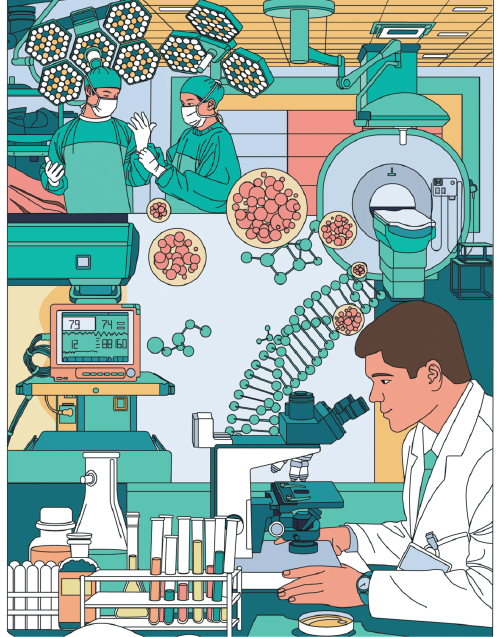Drug, medical device sectors aided

SHI YU/CHINA DAILY
Beneficial policies further support development of key industries
Stronger supportive policies will further boost the development of China's pharmaceutical and medical equipment industries, injecting new momentum into their innovation-driven growth, according to experts and industry people.
The policies will also increase the presence of domestic companies in these industries overseas while helping safeguard Chinese people's interests, they said after the central government adopted new documents on the measures.
In late last month, an executive meeting of the State Council, China's Cabinet, adopted three-year action plans for the high-quality development of the pharmaceutical and medical equipment sectors.
Chaired by Premier Li Qiang, the meeting said efforts will be made to further modernize the sectors and make them more resilient, enhance the country's supply capacity of high-end drugs, key technologies and raw and auxiliary materials, and shore up weak links in high-end medical equipment.
As research and development and innovation in the pharmaceutical sector face great difficulties — in part because they are time-consuming and require large investment — stronger support will be provided to help leading pharmaceutical enterprises survive and thrive and enhance their market competitiveness, the meeting said.
It is imperative to attach great importance to the promotion and application of domestically developed medical equipment. Furthermore, relevant support policies should be fine-tuned to facilitate upgrades, the meeting noted.
Flora Zhu, director of China Corporate Research at Fitch Ratings, said China's latest plans to promote high-quality development of pharmaceutical and medical equipment manufacturing underscores the two sectors' strategic importance to the nation's economic growth and will stimulate R&D in the sectors, with the government emphasizing and promoting innovation and stepping up policy support.
"China has a large pharmaceutical market and a long and complete pharmaceutical supply chain, but its reliance on foreign products is high in segments such as innovative and biological drugs and high-performance medical equipment," she said.
"The R&D spending of domestic pharmaceutical companies has been increasing rapidly over the past few years amid China's healthcare reforms aiming to improve drug quality and encourage innovation, while the technology gaps between Chinese companies and their global peers remain large.
"Meanwhile, China's heavy reliance on value-added imports has become a potential source of vulnerability amid rising geopolitical tensions and underscores the need for further domestic innovation in the technology arenas."
Zhu said Fitch expects leading players to benefit the most from the latest plans, with the government encouraging the development of large pharmaceutical companies to increase competitiveness and drive industry concentration.
Leading players are also likely to further scale up R&D investment in a favorable policy environment, she added.
Making progress
China's pharmaceutical and medical device industries have been undergoing fundamental upgrades since the country ushered in a series of regulatory reforms in the sectors in 2015.
The new medical product review standards and methodologies in China are on a fast-track to align with world-class standards, and have boosted the quality and quantity of clinical trials, according to Wu Yangfeng, executive vice-president of the Peking University Clinical Research Institute.
Since 2021, R&D investment in these industries has been growing at 23 percent per year on average, data from the Ministry of Industry and Information Technology showed.
Eighty-two homegrown innovative drugs and 217 innovative medical devices have entered the domestic market, while four innovative drugs have been registered in developed countries for market launch.
Behind that is the growing innovation capability of domestic enterprises and their eagerness to grow bigger and stronger.
For instance, at the recently concluded 2023 China International Fair for Trade in Services in Beijing, the China National Pharmaceutical Group Corporation, or Sinopharm, brought a myriad of innovative solutions used to improve people's health, ranging from newly developed drugs to medical distribution and supply systems.
The company has established five national, 43 provincial and more than 500 prefecture and city-level logistics centers, which jointly ensure its ability to supply urgently needed drugs anywhere in the country within 24 hours.
In 2020, Sinopharm successfully developed the world's first inactivated COVID-19 vaccine, which over the past several years has been approved for use in more than 119 countries, regions and international organizations.
With more than 3.5 billion doses distributed worldwide, the company has greatly contributed to anti-pandemic efforts.
Hu Jianwei, vice-president of Sinopharm, said the company will continue to seek opportunities in emerging sectors, increase investments in scientific R&D, persist in its efforts to innovate and launch more new products at a faster pace.
The company will also strengthen coordination between its huge array of businesses to make it more competitive.
Leading biotech company BeiGene also said it is aiming to discover and develop innovative oncology treatments and radically expand access to drugs for far more patients who need them.
The company has a global team of more than 10,000 people spanning five continents, with administrative offices in Beijing, Basel in Switzerland, and Cambridge in the United States.
Its flagship cancer drug Brukinsa has been approved in over 65 markets globally, including in the US.
Copyright © Foreign Affairs Office of Guangzhou Municipal Government,
Hong Kong and Macao Affairs Office of Guangzhou Municipal Government All rights reserved.
Presented by China Daily.
京ICP备13028878号-28



